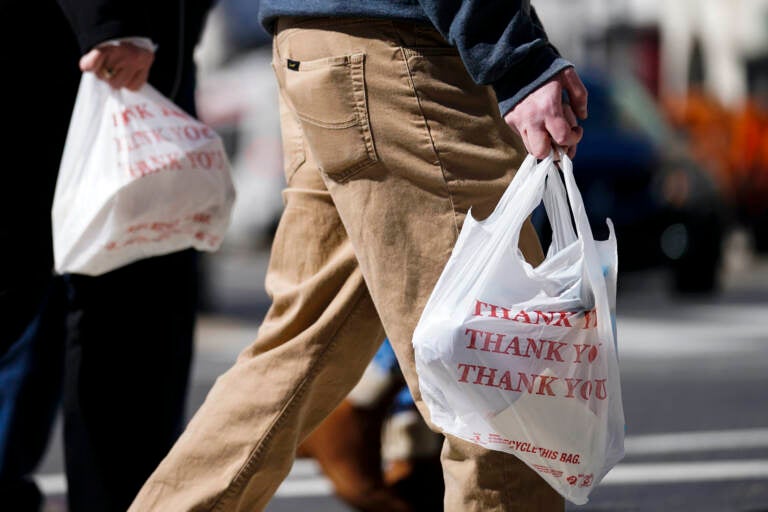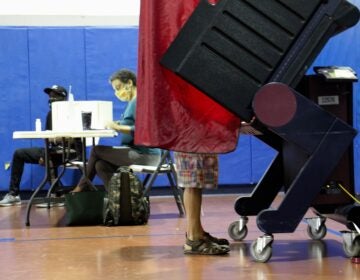An industry study about New Jersey’s plastic bag ban is an example of how to stay vigilant against misinformation
A story that went viral was a one-sided study against New Jersey’s two-year-old ban on single-use plastic shopping bags.
Listen 2:07
File hoto: Pedestrians carry plastic bags, Wednesday, March 3, 2021. (AP Photo/Matt Rourke)
From Camden and Cherry Hill to Trenton and the Jersey Shore, what about life in New Jersey do you want WHYY News to cover? Let us know.
The results were in and they grabbed the attention of many.
A study by the Freedonia Group that found plastic consumption went up after New Jersey banned single-use plastic shopping bags began to make the rounds in late January. Several media outlets picked up the story.
But the study was paid for by the American Recyclable Plastic Bag Alliance, a group that lobbies against plastic bag bans across the country.
Dr. Travis Wagner, professor emeritus at the University of Southern Maine, called the study “just a poor piece of misinformation.” He said the source of some of their data is unclear and that the study was not peer-reviewed.
“It’s trying to advocate a particular position without doing a balanced presentation,” said Wagner. “From a basic research perspective, it is not an objective document.”
Industry study claims dramatic increase in plastic consumption after the ban
The Freedonia study claims the shift from single-use plastic shopping bags to reusable bags resulted in nearly three times more plastic being consumed. At the same time, six times more plastic was used to make reusable shopping bags.
Another claim from the study is that 90% of all reusable bags are reused only two to three times before being discarded.
But Wagner said the claim doesn’t match up with previous research.
“What they assume is if you ban all plastic bags, everyone goes out and purchases new bags or you’re always gonna purchase new reusable bags,” he said. “But many people have lots of reusable bags in their closet or in their trunk or whatever and they get reused.”
The New Jersey Department of Environmental Protection said the Freedonia study focuses on the unintended consequences of the plastic bag ban — one of them being the production of more polypropylene bags to replace single-use plastic bags.
“DEP identified this issue as an opportunity for action in its first-year report and has been working with counties, industries, and others to come up with solutions,” said DEP spokeswoman Caryn Shinske. “Polypropylene bags fall under New Jersey’s recycled content law and should be recycled at the end of their lifespan.”
‘Take a few minutes’ to find out where that came from
When it comes to an industry formulating studies to boost a product, the number one example people point to is the tobacco industry, according to Dr. Britt Paris, an assistant professor at Rutgers University. She said it was chronicled in the book “Merchants of Doubt.”
“The tobacco industry in the 1960s was coming under increasing fire for the health problems people were noticing [in relation to] smoking over the years,” she said. “They engaged in a lot of these types of studies that were scientifically flawed investigations that essentially exonerated the tobacco industry of culpability for these health problems that people were experiencing.”
If a study sounds too good to be true, Paris suggests, investigate where the study came from and who funded it.
“Take a look for yourself to see if it passes your own smell test of whether or not it was appropriately researched and thoughtfully done,” she said.
Paris adds people should also be cautious sharing stories on social media when they don’t have all of the facts.
“If you’re not sure about something, you don’t have to have an opinion on it and you don’t have to post about it.”
“[Take] a couple of seconds to calm down and not share something,” she said. “Even if you have a strong reaction to it … [take] those few moments to do a little background research into a story that is highly inflammatory or really gets you excited or angry or something like that.”

Get daily updates from WHYY News!
WHYY is your source for fact-based, in-depth journalism and information. As a nonprofit organization, we rely on financial support from readers like you. Please give today.







